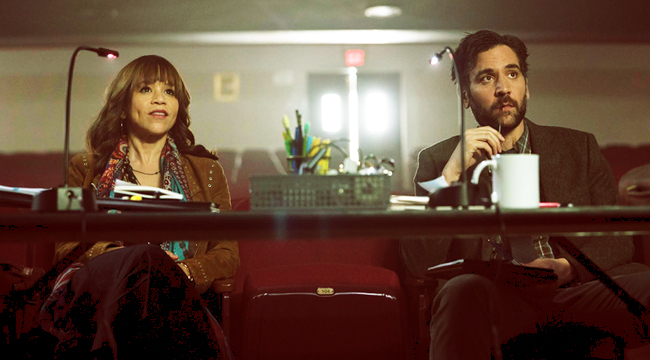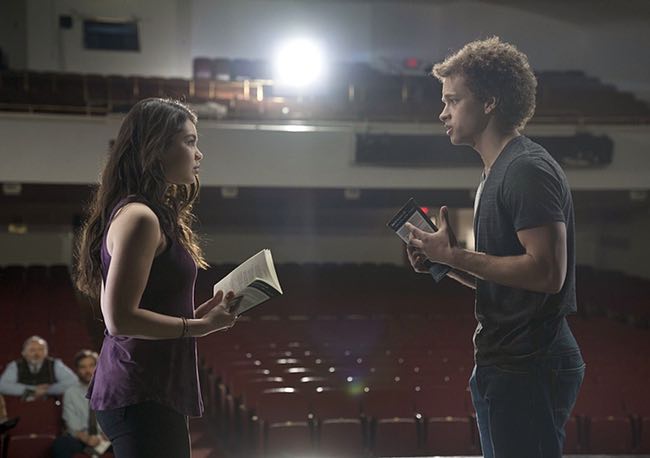
Within the opening minutes of NBC’s Rise, we see glimpses of a small town that’s seen better days, filmed from the POV of a car driving through it, we check in on a high school football practice, and hear the team’s star player referred to as “QB1.” Between those early signifiers and the creator credit for Jason Katims, a viewer couldn’t be blamed for assuming Rise will be a stealthy Friday Night Lights sequel series.
It’s not that(*), on a couple of different levels. First, Rise — which Katims adapted from the non-fiction book Drama High by Michael Sokolove — focuses on the high school’s theater department, though QB1 and the football coach both wind up as significant characters. Second, where FNL rarely hit a wrong note outside of its anomalous second season, Rise (it debuts tomorrow night at 10; I’ve seen all 10 episodes) is disappointingly off-key a lot of the time, which only becomes more frustrating in those moments when it shows itself capable of nailing a big showcase.
(*) Although the eighth episode is so structurally evocative of FNL, one wonders if Katims was feeling particularly nostalgic that week.
Many of the series’ problems can be pinned on its main character, Lou Mazzuchelli, played by Josh Radnor from How I Met Your Mother. When the series begins, “Mr. Mazzu” has been teaching English in the dying steel town of Stanton, PA for almost 20 years, and seems to be competing with his own students for who can feel less passionate about the material. Desperate to feel like he’s actually making a difference to anyone other than his wife Gail (Marley Shelton) and their three kids, he talks his way into taking over the theater program, elbowing out longtime assistant director Tracey Wolfe (Rosie Perez) just as she’s about to get the top job, and scrapping her plan to stage the school’s third production of Grease in a decade in favor of challenging both the kids and the conservative school district with Spring Awakening.
There’s an earnestness that can border on insufferability in a lot of Radnor’s characters. HIMYM wisely leaned into this, playing Ted’s smugger qualities for laughs. Rise is utterly serious about its leading man — it’s startling, and something of a relief, when Radnor is finally allowed to crack a minor joke in the eighth episode — and, worse, takes far too long in recognizing that he’s not the hero of the story he thinks he is. Lou has plenty of good qualities, and you can see the impact his choice of material has on the kids in the cast, but he’s also presumptuous and intrusive, and in many ways a chore to be around. Every now and then, another character gets to scold Mr. Mazzu for his own narcissism — “Not everything’s about you, Lou,” one of the kids tells him (a message that assistant director Tracey has to repeat several times, to little effect) — but for the most part he’s presented as the show’s moral conscience and inspirational leader in much the same way that Katims used Coach Taylor on FNL, only if nobody ever acknowledged that Coach Taylor was kind of an idiot. Perez is largely left to make Tracey into a three-dimensional character without much material, and she’s so effective, it’s hard not to wish for a version of the show where Lou never stole Tracey’s job, even if it meant season one was about that Grease production.
The heavy emphasis on Lou trying to encourage the students, the other teachers, and even the whole town to live up to the show’s title unfortunately takes away from Rise‘s strengths: namely, the kids themselves. In particular, Moana star Auli’i Cravalho and Damon J. Gillespie are everything the series needs them to be as the play’s two leads: respectively, Lillette, a girl from the wrong side of the tracks with a powerful voice and a lack of confidence, and star quarterback Robbie, who discovers a whole new side of himself when Lou recruits him to join the cast to drum up interest. The other theater kids are a mix of familiar types — Simon (Ted Sutherland) is a religious boy fighting his growing recognition that he’s gay, Gwen (Amy Forsyth) the usual star of the school’s productions who’s unhappy taking a back seat to Lillette — and newer ones like Michael (Ellie Desautels), who’s trans and prefers to change in the boys’ dressing room. All are well cast, even if they’re a mix of actors who look like they could still be in high school and ones who like like they’d fit in with the 1993 graduating class of West Beverly Hills High School. Perhaps because so much time is devoted to Lou, the kids’ storylines can come in fits and starts — one girl, Sasha (Erin Kommor) is glimpsed in the first episode’s audition montage, then vanishes until the sixth episode, where she gets the Nikki and Paolo treatment from Lost, where she’s treated like a character who’s been important all along — but a version of the show that was primarily about their hopes and dreams would be much more effective than the one where they exist first and foremost to be inspired by Lou.

And where Friday Night Lights had intense and far-reaching empathy for nearly everyone wandering around Dillon, TX, Rise is far quicker to turn certain characters into strawman villains whom the more virtuous theater folk can quickly knock down when necessary. (Though the football coach, played by Joe Tippett, gets a good amount of nuance, even as he winds up causing trouble for Lou, Gwen, Robbie, and Lillette at different times.)
Katims doesn’t take the Glee approach of packing the episodes with varied musical numbers, many of them presented as fantasy sequences. Outside of the audition montage and a football party several theater kids crash to sing “Carry On,” the only songs we hear are from Spring Awakening as part of the rehearsal and performance process. These are great, award-winning songs, being sung by talented vocalists (even if many of them are trying to seem less polished to pass as high school amateurs), but your mileage will vary for the repeated snippets of “Mama Who Bore Me” or “Totally Fucked”(*).
(*) In an unintentionally meta bit of business, Lou is told that the F-word can’t be sung in a school production, and when someone tries singing it, anyway, the sound drops out because Rise is a television show on a broadcast network that’s answerable to the FCC.
Like any successful high school theater production as it moves from conception to performance, Rise gains in confidence and effectiveness as it goes along, and the later episodes feature just enough of other characters telling off Lou to suggest that a second season might better understand how to present this guy.
Katims himself came to television from the theater, where he was working as a playwright when he got hired to join the My So-Called Life writing staff. Between that series and Friday Night Lights, he’s been part of two of the four best shows ever made about high school (along with Freaks and Geeks and Buffy the Vampire Slayer). Any time he steps into another fictional classroom, it’s an event, and I know a lot of TV drama fans — not to mention musical theater fans — who’ve been excited for months to see Rise. But not every production, even one with as much raw talent involved as this, seems as brilliant when it’s up on its feet as when it first existed in the writer’s head.
Alan Sepinwall may be reached at sepinwall@uproxx.com. He discusses television weekly on the TV Avalanche podcast. His new book, Breaking Bad 101, is on sale now.
